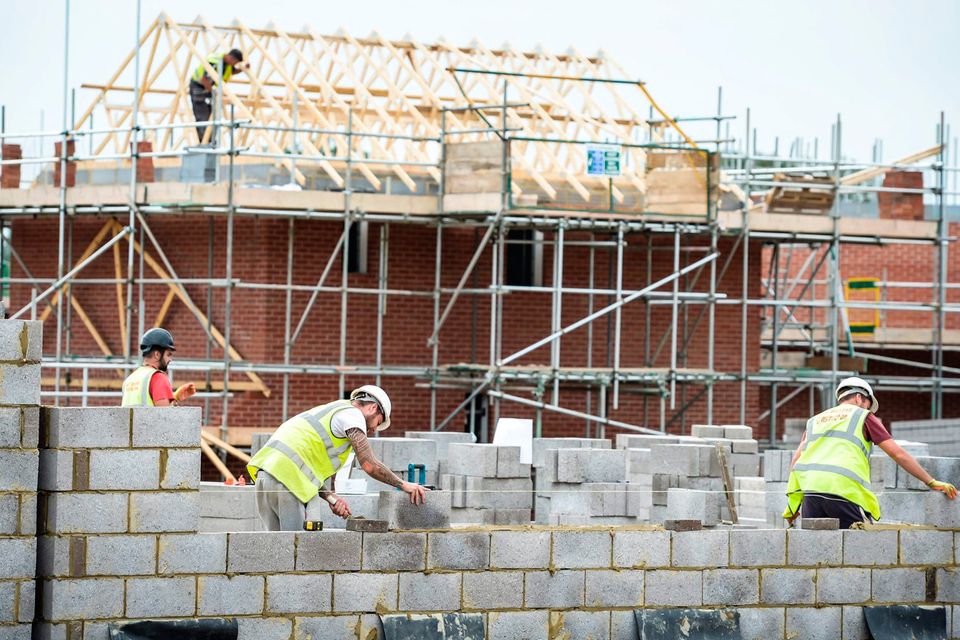David McWilliams: The State must become the Ryanair of house builders
The lack of affordable houses is driving wage inflation. Photo: Ben Birchall/PA
The main reason the public-sector unions are on strike is the price of housing. Sort out housing and we begin to sort out lots of things that are problematic in the economy. Unless the State gets to grips with the fact that middle-ranking workers can't find a place to live in this country, there will be higher and higher wage demands.
If the State could - either itself or via collaboration with the private developers - accelerate cheap house/apartment-building, much of the upward pressure on costs in this country would dissipate. The huge and rising cost of accommodation for people in their twenties and thirties is driving wage demands.
Once wage demands are acquiesced to in one area, then they will spread throughout the public sector like a virus in a creche.
Gardaí and the teachers will be followed by a series of 'me too' strikes and the entire public-sector wage negotiations will unravel.
This might be no bad thing, particularly if the State decides that certain public servants are more valuable to the citizenry than others. It may elevate the status and pay of what it calls 'front-line' workers.
Such a demarcation is entirely possible and is up to the Government. However, any country that presides over a significant increase in the price of its public service will ultimately pay for this via higher taxes and a fall in global competitiveness. Ultimately, high public-sector costs are impoverishing for all.
In a trading economy, the price of goods that are traded on the world market is determined more or less by international competition. So if for the sake of an example, a piece of software produced in Ireland is much more expensive than a similar piece of software produced in France, over time the French tech company will become more competitive and will prevail. In time, the price of the Irish software product will have to fall or the product itself will have to become much better through more sophisticated innovation.
Therefore, the 'signals' emanating from the market either via price sensitivity or customer feedback mean that Irish productivity in the traded sector is policed and rewarded by the norms of the international market.
However, this is not the case in the public service.
If an Irish bureaucrat is more expensive than a French one, there is no mechanism to assess whether the Irish citizen is getting value for money. Is the French bureaucrat more productive or more relevant or providing a better service? It is very hard to tell. We can't measure this but we do know most Irish public servants are paid much more than their French counterparts.
However, this disparity of pay may only reflect the cost of living here and this brings me back to the main costs associated with living in this Republic compared with other countries.
In Ireland, we can see the difference in the cost of living between our jurisdiction and another one very easily. All you have to do is to drive to the North. If the Irish State is not controlling costs in the Republic, the difference will be seen very evidently in the differing costs of living between the Republic and the North.
Here we have two jurisdictions, one country. The Border provides almost a perfect economic laboratory, so we can evaluate competitiveness immediately.
I have relations in the North and head up to Belfast regularly. The difference in prices is extraordinary.
Even before the 17pc fall in Sterling after the Brexit vote, shoppers from the Republic have always found great value in Newry, Derry and Belfast. The cost of living in Northern Ireland is a fraction of that in the Republic. We are not just talking about the price of slabs of Harp at Sainsbury's in Newry. We are talking about tradesmen from the North, we are talking about the ridiculous notion that German-made white goods and cars sourced from within the Eurozone are cheaper in the North - despite Sterling's fall, which should make them more expensive. Housing is much cheaper, not only rents, but also the actual cost of buying a house is about half of prices in the Republic. Building materials, private medicine, the legal system, car insurance, as well as groceries, are all much cheaper. Even mortgage rates are lower in the North than in the Republic despite the fact that British central bank rates are actually higher than Eurozone rates.
How could this be?
If costs in the Irish traded sector are kept in check by international competition, then the Irish price rises can come only from those areas that are not traded. Therefore the main culprit must be the State's inability to find value for money for the citizen because the State is the biggest buyer of services in Ireland.
As it gets less value for your money, the higher costs go.
This is why lots of people love to have a contract with the State. It is a boon. We saw an example of this so starkly in the Tribunals, where the legal bills were eye-watering for what was a bit of a whitewash in the end.
The same gouging of taxpayers' money is going on all the time, otherwise prices couldn't be rising, which drives up the cost of everything relative to the North.
Of course, the biggest rip-off is property and land. We have the least densely populated country in Western Europe, with the highest property prices.
A small number of very rich landowners are benefiting, while the rest of the country suffers.
It is time for the State to simply go back to building social housing, co-operative schemes and old-fashioned council houses. This is the way forward. The State must become the Ryanair of house builders.
Unless the cost of accommodation falls significantly, wage demands will continue.
But accommodation is only the start of it.
In the past 20 years, the cost of living in our country has become prohibitive. Lots of people have decent wages, but have nothing left at the end of the month because costs have skyrocketed. Local businesses trying to export are put to the pin of their collar because our internal costs are so high. The culprit is the vast State apparatus.
The State apparatus is the biggest buyer of goods and services in the country and it is the source of cost inflation. The higher its costs, the higher taxes have to be to balance the budget. As taxes go up, take-home pay goes down and the percentage left to pay rents/mortgages also diminishes. This is why the cops are on strike.
Control basic costs and you control basic pay.
Let basic costs go out of control and you get anarchy. It really is that simple.
Join the Irish Independent WhatsApp channel
Stay up to date with all the latest news















